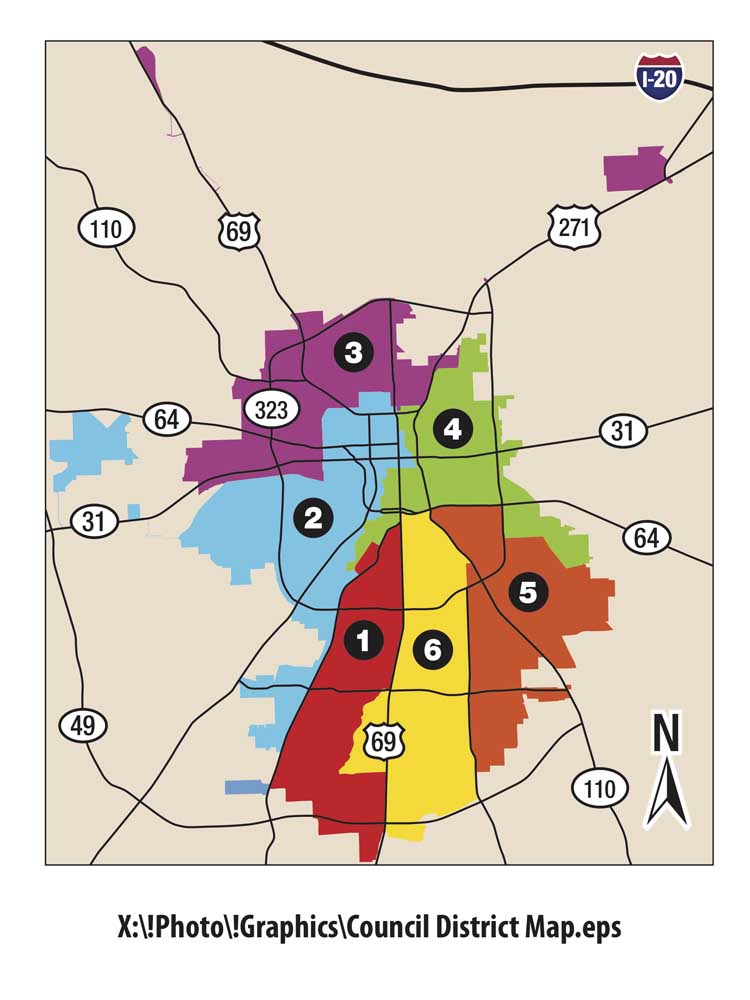Tyler City Council looks toward 2021 redistricting
Published 12:01 pm Wednesday, August 7, 2019

- Brian Crane/staffTyler City Council districts 1 through 6 are shown. A new district to better serve Hispanic residents, redrawn districts in the southern part of the city and other setups for the City Council could all be on the table.
City Council districts in Tyler could be different come 2021, thanks to a redistricting process scheduled to start after the upcoming U.S. Census.
A new district to better serve Hispanic residents, redrawn districts in the southern part of the city and other setups for the City Council could all be on the table.
City Attorney Deborah Pullam gave a presentation on the issue Monday at the City Council retreat held at Marvin United Methodist Church.
Pullam told the City Council that the city manager’s office, the city attorney’s office and a consulting firm would be available to them, but “it is the council who is responsible for doing the redistricting plan.”
The consulting firm will be Bickerstaff Heath Delgado Acosta LLP, city manager Ed Broussard said. The firm has offices in Austin, Houston and El Paso, according to its website.
“Based upon kind of the directions that the council wants to do, (they use a) technical, as far as, just data-driven format, to draw and redraw maps to satisfy what you then as the council want to see,” Broussard said.
Councilman Don Warren, who represents a district with a significant Hispanic population, said there has been talk about creating a district that would better represent Tyler’s Hispanic population.
Currently no members of the City Council identify as Hispanic. Historically, there has only been one person with a Hispanic surname to sit on the City Council, Gus Ramirez.
The idea is similar to an initiative in the 1960s and 1970s to create City Council districts to ensure African-American Tylerites had sufficient representation in city government. The districts, often called west and northwest and currently represented by Broderick McGee and Shirley McKellar, came out of that process.
Warren’s district in the northeastern section of Tyler includes most properties north of Fifth Street and east of Beckham Avenue, plus some neighborhoods near Our Lady of Guadalupe Catholic Church on Old Omen Road.
In May, Warren said his district is 45 percent Anglo, 35 percent Hispanic and 18 percent African American.
“How does that occur when you’ve got six districts,” Warren asked Pullam of creating a Hispanic district. “Do you create a seventh?”
Pullam said: “You can.”
Broussard said: “You’d have to create a seventh and an eighth.”
The City Council has six members and the mayor acts as the seventh, at-large member. The setup creates an odd number of votes on city issues, so votes usually can’t tie.
“You’d want to, in order to have an odd number to carry votes,” Pullam added. “You could create seven and just create a mess for yourselves.”
She said city councils have drawn districts for different communities of interest — such as races, ethnic groups, senior citizens and families — in various ways. She said the first step is getting the data from the U.S. Census analyzed and mapped.
“If you get enough numbers that indicate that there may be enough Hispanics and Latinos in the city that they can carry one, two districts, then you have to consider that in terms of drawing the lines,” Pullam said.
She said districts would need to be roughly the same size in terms of population, and there’s a specific percentage of variation legally permitted. To draw them to serve communities of interest, the data would usually come from the voting-age population, she said.
Pullam outlined ways that districts should not be drawn because they would skirt federal voting laws and gave an overview of court decisions that have affected Texas.
The method referred to as “cracking” puts people of an ethnic group across several different districts, therefore illegally weakening their vote, she said. “Packing” puts as many people as possible in one district, lowering their influence in other districts.
She said the U.S Department of Justice, which has historically monitored districts, no longer needs to review plans, because of recent federal court decisions lifting the state of Texas from federal review.
She said the legal rationale for the decision was that affected communities now have more organizations representing their interests and resources to be able to mount a legal challenge if they wanted.
Broussard told the City Council it’s important for them to encourage every household and every person in their district to fill out the U.S. Census survey come 2020.
“This is where it kind of hits home,” he said.
TWITTER and INSTAGRAM: @_erinmansfield







